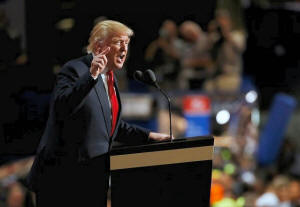|
Trump lawyers to urge dismissal of
university case in U.S. court
 Send a link to a friend
Send a link to a friend
 [July 22, 2016]
By Karen Freifeld [July 22, 2016]
By Karen Freifeld
NEW YORK (Reuters) - A U.S. District judge
will hear arguments on Friday over whether to dismiss a 2013 fraud
lawsuit against Republican presidential nominee Donald Trump stemming
from his Trump University real-estate seminars.
Trump's lawyers will also ask federal judge Gonzalo Curiel in San Diego
to decertify the class action, which would force students to file
individual lawsuits rather than pursue their fraud cases together.
The lawsuit, one of at least three over the defunct Trump University,
was filed on behalf of students who paid up to $35,000 to learn Trump's
real estate investing "secrets" from his "hand-picked" instructors.
The cases against Trump University have regularly cropped up during the
presidential campaign. Trump ignited a firestorm of criticism in May
when he accused Curiel, who is of Mexican descent, of being biased
against him because of the candidate's pledge to build a border wall
between the United States and Mexico.
Curiel, who was born in Indiana, is presiding over two of the cases,
with one set for trial in late November. A separate lawsuit by New
York's attorney general is pending in that state.

Trump's lawyers say Curiel should toss the 2013 California lawsuit on
the grounds that Trump, though personally involved in developing the
concept and curriculum, relied on other executives to manage Trump
University by the time the plaintiffs purchased their seminars.
In addition, Trump's lawyers claim references in marketing materials to
"secrets," "hand-picked" instructors or "university" were mere sales
"puffery." According to the defense, there is no evidence Trump intended
to defraud students.
Lawyers for the students have rejected those arguments, saying the New
York developer conducted the marketing for Trump University more than
anyone else, starring in and approving promotional materials.
[to top of second column] |

Republican U.S. presidential nominee Donald Trump formally accepts
the nomination at the Republican National Convention in Cleveland,
Ohio, U.S. July 21, 2016. REUTERS/Mario Anzuoni

They claim Trump University instructors were high-pressure sales
people, not "professors and adjunct professors" as Trump touted, and
that New York authorities told Trump back in 2005 to stop calling
his unaccredited venture a university.
Trump owned 92 percent of Trump University and had control over all
major decisions, plaintiffs' court papers say, and should be held
liable under a statute targeting racketeering.
The court papers also say Trump confessed to misrepresentations in
sworn testimony, and that evidence of his intent to defraud is
"overwhelming."
(Reporting By Karen Freifeld; Editing by Anthony Lin and Tom Brown)
[© 2016 Thomson Reuters. All rights
reserved.]
Copyright 2016 Reuters. All rights reserved. This material may not be published,
broadcast, rewritten or redistributed.

 |